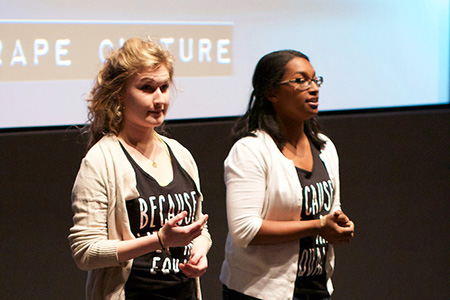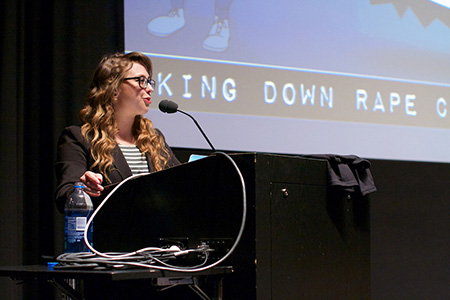Laci Green addresses rape culture in campus talk

Emerald Empowerment Week co-chairs Madeline Beimford ’16 and Alicia Carroll ’15 address the student audience before Laci Green’s talk at the Bright Family Screening Room of the Paramount Center on April 13. (Photo by Nick Eaton ’17)
Social activist and YouTube host Laci Green discussed the hard facts of rape culture during a discussion with Emerson students on April 13 in a packed Bright Family Screening Room.
 Green, who hosts Sex+ and MTV’s first original YouTube channel, Braless, is a certified rape and dating violence crisis counselor and was at Emerson as part of Emerald Empowerment Week.
Green, who hosts Sex+ and MTV’s first original YouTube channel, Braless, is a certified rape and dating violence crisis counselor and was at Emerson as part of Emerald Empowerment Week.
The week of events, organized by the Kappa Gamma Chi sorority, is dedicated to campaigning against power-based interpersonal violence, which includes domestic violence and sexual assault. Proceeds from the week will benefit survivors of domestic violence at Casa Myrna Vazquez and Transition House.
While Green is well versed in the troubling topic of sexual assault, she said even she was upset by the content of her lecture, “Taking Down Rape Culture.”
“There’s some pretty upsetting stuff in this program,” Green said. “I’ve given this program a million times, and it still upsets me.”
The program itself centered on proving the existence of rape culture, defining it, and how students could be empowered to make a difference. While “rape culture” is a term that is finally entering more discussions across the country, Green says it is important for students to be educated as advocates against it.

Laci Green speaks at the Bright Family Screening Room of the Paramount Center on April 13. (Photo by Nick Eaton ’17)
“This is a term that is coming into cultural awareness right now, [and] a lot of people are talking about it,” Green said. “So, I think it’s really important to empower you as advocates, and as students here, to have the tools to really understand the scope of this problem and how we can effectively tackle it.”
According to Green, tolerance of rape and sexual assault is something our culture does as a whole, shaped by how the media frames stories on attacks. Using video clips of television news reports as examples, Green pointed to the well-publicized gang rape case of a teenage girl in Steubenville, Ohio, highlighting instances when the media appeared to show sympathy for the accused rapists.
Another pillar of rape culture that Green defined as “insidious” included the existence of gender roles as a cultural construct.
“When we think of rape as an exertion of power, [gender roles] are laying the groundwork,” she said.
Green traced gender roles—which dictate how genders should act and what their place is within a society—back to popular culture, including the controversial music video “Blurred Lines” by Robin Thicke.
While the topic was grim, Green ended with a call to action, empowering students to take down rape culture. She encouraged students to cultivate a culture of consent, challenge gender stereotypes, and act as watchdogs for sexual assault and rape culture.
“We need to stand up, we need to get serious,” she said. “Let’s take action, let’s take down rape culture.”
Emerson College offers numerous resources to anyone who has been affected in any way at any time, whether recently or in years past, by power-based interpersonal violence, which includes sexual assault, stalking, and abusive relationships.
Visit the Violence Prevention and Response website for more information, which includes contact information for resources in Boston, Los Angeles, and the Netherlands.
Categories